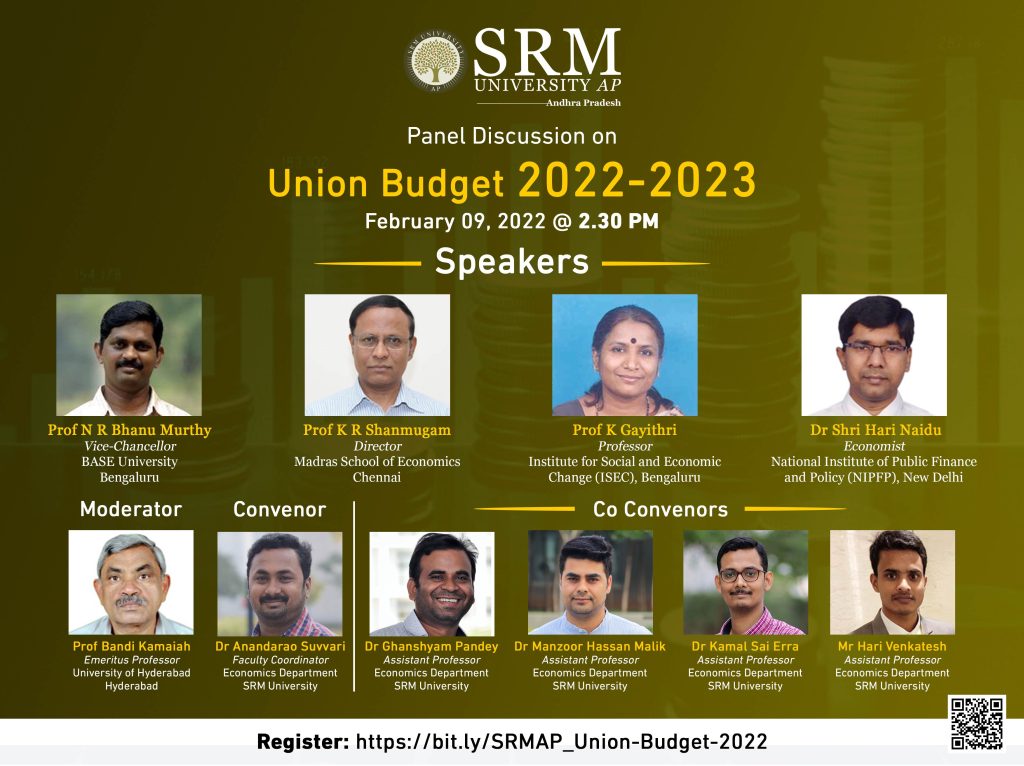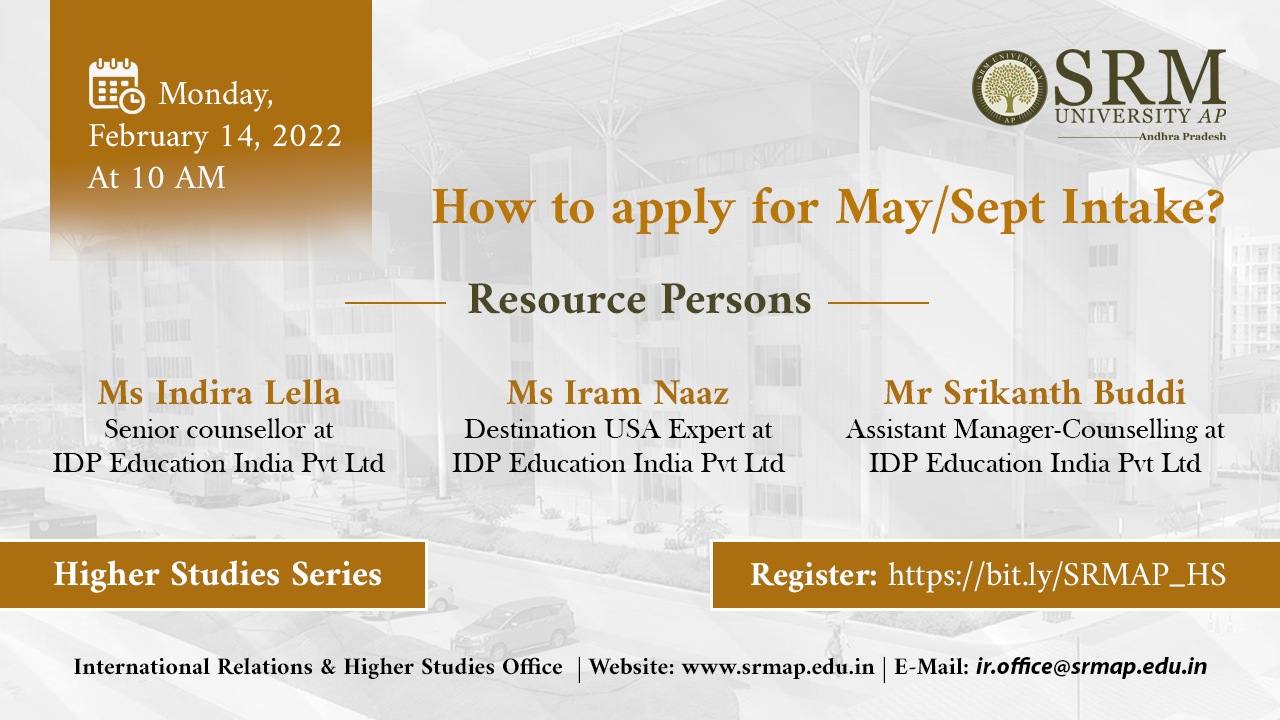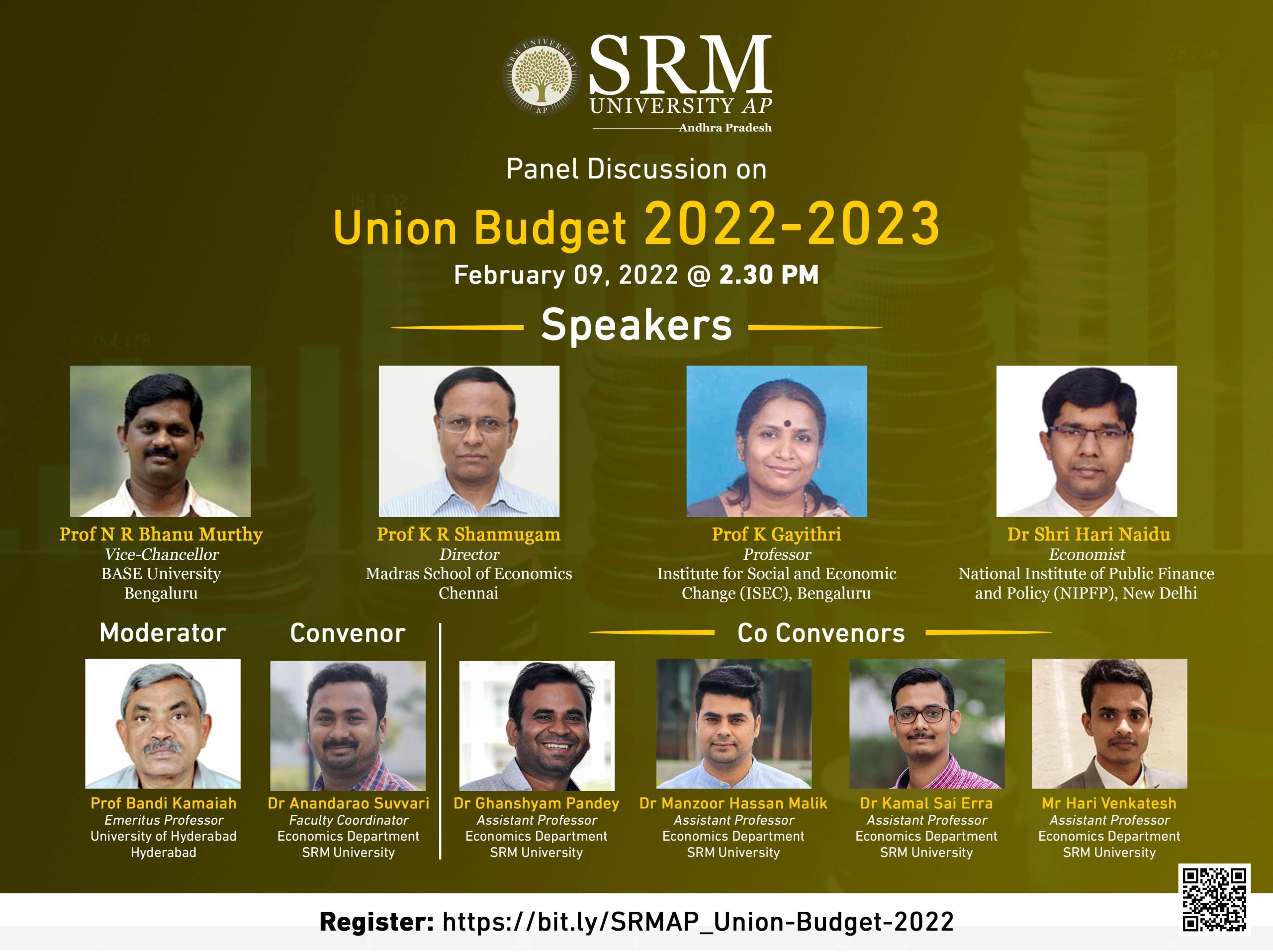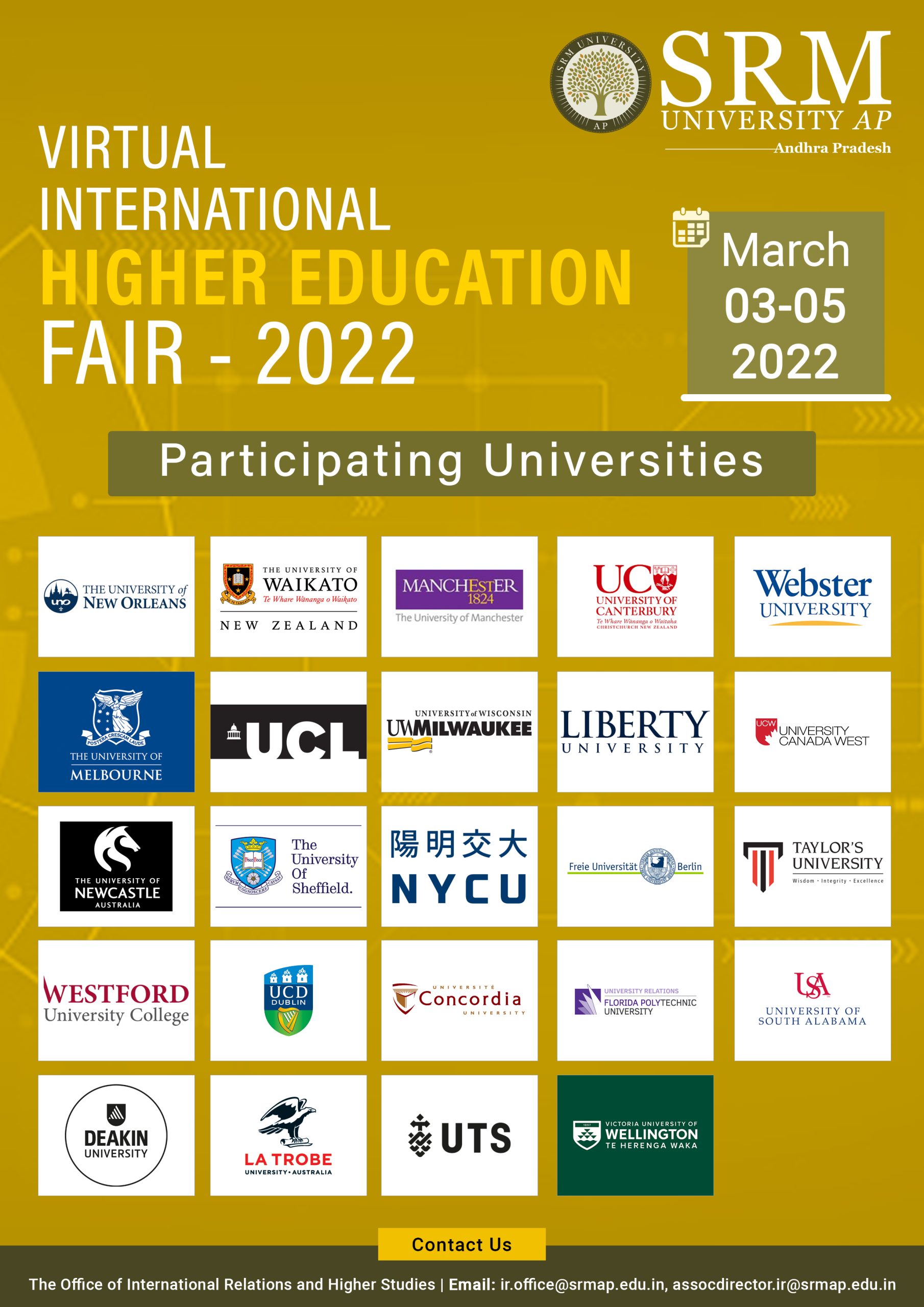- Budget Panel Discussion 2022-23 February 10, 2022
 The Department of Economics of SRM University-AP, Andhra Pradesh, conducted a Panel Discussion on February 09, 2022, for the much needed and relevant in-depth analysis of the Union Budget proposed by the Finance Minister in the parliament on February 01, 2022.
The Department of Economics of SRM University-AP, Andhra Pradesh, conducted a Panel Discussion on February 09, 2022, for the much needed and relevant in-depth analysis of the Union Budget proposed by the Finance Minister in the parliament on February 01, 2022. Professor Bandi Kamaiah was the moderator of the event, and Dr Anandarao Suvvari, the faculty coordinator of the Department of Economics in the University, organised this discussion, inviting four eminent public finance economists of India, Prof N R Bhanu Murthy, Vice-Chancellor, BASE University, Bengaluru; Prof K R Shanmugam, Director, Madras School of Economics, Chennai; Prof K Gayathri, Professor, Institute for Social and Economic Change (ISEC), Bengaluru; Dr Shri Hari Naidu, Economist, National Institute of Public Finance and Policy (NIPFP), New Delhi. The co-convenors of the event were Dr Ghanshyam Pandey, Dr Manzoor Hassan Malik, Dr Kamal Sai Erra, Dr Hari Venkatesh from the Department of Economics SRM-AP.
The discussion started with a brief overview and essence of the Union budget by Dr Anandarao Suvvari, followed by Prof Bandi Kamaiah. Then first panellist Prof N R Bhanu Murthy, who our Indian Finance Minister also quoted, spoke about how the current budget is a continuation of the previous budget and emphasised more on the capital expenditure, which is the route to growth. He highlighted that the government should bring efficiency in public expenditure and expressed that the public policymakers side-lined the public debt number to GDP ratio at both central and state levels. An issue identified by Prof Murthy was bringing in many commodities under the customs tariff line and how doing this will have a negative impact on the exports. Further, he mentioned the ignorance towards the health and education sectors by a reduction in the allocation of expenditure for the same.
The second panellist Prof K R Shanmugam, gave a very detailed look at the budget, sector by sector, pointing out the benefits and the concerns related to each of them. He gave us a brief look at how the Indian economy has been doing for the past few years and gave an analysis taking this into consideration and stated that the budget had provided necessary fiscal stimuli through an increase in capital expenditure for the revival of the economy.
The third panellist Prof K Gayathri highlighted the philosophy of policy implications of budget and the need for a continuous process for analysing it. She also focused on the need for scientificity for estimates and the need for a sustainable approach for the budget. She pointed out that the current budget was future-looking in line with the vision for India 100 and that it put thorough emphasis on capacity building inclusive development by involving all stakeholders and modern infrastructure while expressing concern over effective implementation of policies.
The final panellist, Dr Shri Hari Naidu, discussed the revenue side of the budget thoroughly while focusing on the new taxation regime, other and legitimising crypto assets and digital Indian currency. In addition to this, Dr Naidu commented on the budget that the tax GDP ratio has been stagnant for the past two decades also, it has not been addressed in the budget, and despite the fact that there were a lot of tax reforms, the tax bases needed to be expanded.
After individual reviews by the panellists, questions posed by the students and the co-convenors were answered, followed by an interactive and engaging discussion among panellists, moderator, convenor and co-convenors on various issues spanning from the way of analysing the budget, trade-offs between debt and capital expenditure, debt sustainability, control mechanisms, the process of allocation, outcome evaluation or impact of the budget and the need for reality and effectiveness of planned budget on the ground level.
The session, after a thorough discussion on the union budget, was concluded by a vote of thanks proposed by Asst. Prof. Dr Hari Venkatesh to the esteemed panellists, moderator, convenor, co-convenors and all the people who made this session successful for contributing their precious time and valued efforts.
Continue reading → - Scope for ECE Students February 10, 2022
Electronics and Communications Engineering or ECE is a very popular educational choice for the prospective engineering students. ECE students can have careers in industries like consumer electronics manufacturing organization, Automotive, Telecommunication & IT industries, Health care equipment manufacturing, Mobile communication (2G, 3G, and 4G), Internet technologies, Power Electronics, and other industries like steel, petroleum, and chemical industry etc.
ECE students also have lots of opportunities in Government and private companies in the areas of design, manufacture, installation, operation, and maintenance of electronics equipment and systems. New opportunities and avenues are also opening for electronics & communication engineers due to the integration of electronics into various new industrial verticals.
The latest technologies include self-driving cars, autonomous drone logistics, robotics, automation in industries, smart energy systems etc. But getting acquainted with these industries will not be easy. They demand engineers who have more hands-on experience with the latest technologies.
Electronics students with skills in robotics, automation technologies, renewable energies, Internet of Things (IoT), mechatronics engineering concepts add more value to their average pay scale. Students pursuing electronics engineering aim to get a highly paid job, so improving their skill sets will impact their pay scale a lot.
Major technologies in which an ECE engineer can work on:
- Analog and Radio Frequency Circuits: Without these cell phones, Wi-Fi, television will cease to exist. A lot of industries are established to meet consumer demands, and, in the process, they opened a lot of job opportunities for electronics engineers.
- Communication & Signal Processing: This technology particularly finds its application in the transmission, storage, and analysis of information signals.
- Computer & Digital Systems: All the industries are able to advance technologically at a faster pace than before with the help of computers. These digital systems are everywhere from smartwatches to Mars rovers.
- Networking: With the boom on the internet, we are experiencing 3G, 4G services that help organizations and industries to easily collaborate with people. There is a lot of scope for engineers who want to work in this technology.
- Computer vision & Image processing: These technologies are helping computers in the areas like medical, surveying, photogrammetry etc. For instance, now we have medical devices that can analyse data to not only display images but identify diseases too with the help of magneto-resonance imaging technology
- Control systems & Robotics: With the advancement in technologies lately more and more industries are adopting automation and robots into their operations to improve their efficiency. And a lot more industries are expected to adopt these technologies in the coming years.
- Remote Sensing: Communication via radio waves is essential for mobile devices, radios, and all the devices that are connected to the internet. From mapping to navigation, remote sensing plays a vital role in various technologies.
- Nanotechnology: The more efficient solar cells, faster transistors, tracking chips and microscopic sensors that we see today are the products of nanotechnology. A lot of industries are adopting this technology to make their products smaller and more efficient.
- Sustainable Energy & Power systems: Now industries are investing lots of their money and time to develop more efficient solar cells, windmills, systems that can generate power from tides etc. This technology offers a wide range of job opportunities for electronics engineers.
- Energy Storage Technology: The demand for energy storage systems is likely to grow exponentially globally as the world shifts towards renewable energy sources. This shift will mandate both grid level and unit level energy storage systems that are of viable size, cost, and energy efficiency. Significant research is currently being conducted on materials, engineering, and other optimisations.
Skills that an ECE student needs to develop to improve job prospects:
If you are an ECE student, here are some of the skills and areas that you need to concentrate on to improve your job prospects:
- Computer proficiency is a must these days; try to get acquainted with some of the industrial-grade software.
- Develop your communication and interpersonal skills
- Develop more practical skills and get hands-on experience on theoretical concepts
- Get exposed to current industrial methodologies as much as possible
- Stay updated with the latest technologies by developing projects on them
- Do additional certified training programs to build your profile
- Take additional responsibilities in your college to showcase your managerial skills
- Develop your leadership and team working abilities
ECE at SRMAP:
Studying ECE at SRMAP offers students the unique opportunity to gain experiences, skills and knowledge which will set them apart from their peers.
- Semester Abroad Programme: For those who strive to learn cutting edge practices from reputed Universities abroad, SRMAP offers a dream-come-true opportunity to the selected students to obtain necessary skills and insights which will make them shine among their competitors.
- Centres of Excellence: The centres of excellence will nurture the potential in students by giving them a working environment and allowing them to test their mettle.
- Multidisciplinary curriculum: The curriculum at SRMAP is fluid. It draws upon traditional courses with a modern and practical outlook. However, the most prominent feature of the curriculum at SRMAP is that it transcends convention, focuses on recent trends in research and technology. and provides the students with the essential tools wot take the forefront positions in their field.
- Placements: Placements at SRMAP are extremely motivated by the individual’s needs and career aspirations. The students are given relevant advice since day one and often train to acquire skills as per their strengths and ambitions. This makes them the suitable candidate for their dream job with exciting offers in their hands.
- How to apply for May/Sept intake of foreign universities February 10, 2022
 Understanding the application process for universities and colleges outside of India can be difficult because it differs significantly from those of Indian institutes.
Understanding the application process for universities and colleges outside of India can be difficult because it differs significantly from those of Indian institutes.The office of International Relations and Higher Studies at SRM University-AP is organising a session with international education experts as a part of the Higher Studies Series. Ms Lella Indira, Mr Srikanth Buddi and Ms Iram Naaz will enlighten the students on the topic “How to apply for May/Sept Intake?”.
It’s natural to be unsure about where to begin your application process. So, if you’re applying for the subsequent intakes, join this informative session on February 14, 2022, at 10.00 am.
Speakers’ Profile:
Lella Indira: She is a certified Canada destination expert with overall 6 yrs of Canada destination experience.
Srikanth Buddi: He is a certified destination expert with overall more than 6 yrs of UK destination expert. He has completed his masters in the UK and is currently working in the capacity of Assistant Manager-UK for four years.
Iram Naaz: She is a certified destination expert with overall 3 years of experience. She has been working as a USA Counselor for two years.
Continue reading → - Panel Discussion on Union Budget 2022-2023 February 7, 2022
 The department of Economics is bringing forth a panel of economists to discuss the implications of the Union Budget 2022-2023. The panel will confer upon the vision of the new budget and its impact on our society.
The department of Economics is bringing forth a panel of economists to discuss the implications of the Union Budget 2022-2023. The panel will confer upon the vision of the new budget and its impact on our society.Date: February 09, 2022 (Wednesday)
Time: 2.30 pm IST
The Speakers List
- Prof N R Bhanu Murthy, Vice-Chancellor, BASE University, Bengaluru
- Prof K R Shanmugam, Director, Madras School of Economics, Chennai
- Prof K Gayithri, Professor, Institute for Social and Economic Change (ISEC), Bengaluru
- Dr Shri Hari Naidu, Economist, National Institute of Public Finance and Policy (NIPFP), New Delhi
Moderator
- Prof Bandi Kamaiah, Emeritus Professor, University of Hyderabad
Convenor of the Event
- Dr Anandarao Suvvari, Faculty Coordinator, Economics Department, SRM University-AP
Co-Convenors of the Event
- Dr Ghanshyam Pandey, Assistant Professor, Economics Department, SRM University-AP
- Dr Manzoor Hassan Malik, Assistant Professor, Economics Department, SRM University-AP
- Dr Kamal Sai Erra, Assistant Professor, Economics Department, SRM University-AP
- Mr Hari Venkatesh, Assistant Professor, Economics Department, SRM University-AP
Join the session to learn more about how the Union Budget 2022-2023 will affect you along with the rest of the country.
Continue reading → - Choose from endless study options at Higher Education Fair February 7, 2022

Now that you’ve realised how valuable international education is through various activities organised by the International Relations and Higher Studies Office, the next step is to figure out how to get it.
We at the Office of International Relations and Higher Studies can assist you in navigating the different options available and guiding you through the entire study abroad process.
You are invited to actively participate in the International Higher Education Fair on 3-5 March 2022.
Our vast network of partner universities offers a diverse range of study programmes and accommodates admission criteria, allowing students of any educational background to participate in a programme that suits them.
The purpose of the fair is to give students a thorough image of the many study places and programmes available to them. A highly experienced professional expert advisor/university representative will be present at each meeting room of the fair to assist you with your questions.
Register Here Programme Schedule
List of the Universities:
Continue reading →
The University of New Orleans, University of Waikato, The University of Manchester, University of Canterbury, Webster University, The University of Melbourne, University College London, University of Wisconsin-Milwaukee, University of Liberty, University Canada West, The University of Newcastle, The University of Sheffield, National Yang Ming Chiao Tung University (NYCU), Freie Universität Berlin, Taylor’s University, University College Dublin, Concordia University, Florida Polytechnic University, University of South Alabama, Deakin University, La Trobe University, University of Technology Sydney, Victoria University of Wellington, TU Berlin, Tzu Chi University, Cranfield University, Westford University College

